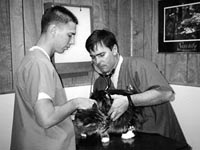Your cat has been diagnosed with cancer. Your veterinarian recommends surgery – a scary prospect. You trust your veterinarian, but you and your cat have never faced such a serious condition. What are the pros and cons? Is surgery a cure? What are the alternatives, if any? Most importantly: How will you know youre making the right decision for your cat?
Youve discussed the diagnosis and treatment plan with your veterinarian, but still have unanswered questions. Perhaps youre doubtful about the diagnosis, the potentially risky treatment, or even your veterinarians experience in dealing with your cats condition. Or perhaps youre wondering whether to explore less invasive treatment options your veterinarian doesnt provide or doesnt support. Like your cat, your veterinarian is an individual. Her approach to diagnosing and treating your cat is influenced by her training, experience, clinical intuition and knowledge of new treatments and techniques.

200
When you have doubts about how to proceed, or youre uncomfortable about the situation in any way, consider seeking a second opinion. A second opinion may be offered regarding reaching the diagnosis, or involving options for treatment, says Tammy Sadek, DVM, hospital director at the Kentwood Cat Clinic in Kentwood, MI, and diplomate of the American Board of Veterinary Practitioners, certified in feline practice. The goal is to obtain additional information for the benefit of the patient, and to aid the client in decision-making regarding their pets health care.
If a client feels that she needs more information or feels that she cant communicate well with the veterinarian, or cant afford the treatment that is recommended, she may want to get another qualified viewpoint to allay any fear, anxiety, and/or guilt, says Dr. Sadek.
Your Primary Veterinarian Can Help
Ask your veterinarian to refer you to a colleague or specialist. If youd rather seek a second opinion on your own, though, you should keep your regular veterinarian in the loop. I think some clients are concerned about hurting their family veterinarians feelings by asking for a second opinion, says Dr. Sadek. But most veterinarians are very positive regarding a client-initiated second opinion. The main concern regarding the secret second opinion is lack of communication, causing negative treatment or diagnostic side effects, such as drug interaction problems by giving your cat medications prescribed by different doctors that shouldnt be given together.
In fact, your veterinarian may even suggest seeking a second opinion. Perhaps she feels shes reached her limit in helping the cat, notes Dr. Sadek. The cat may require a procedure she doesnt offer or may require additional diagnostics or therapeutics accessible through another facility. The veterinarian may also feel the client needs more assurance that the proposed course of action is appropriate. Or she may refer a client to another doctor because she feels that the client needs the benefit of a different communication style regarding care of the patient.
If the client feels that the communication with the veterinarian was not as clear as needed, or they disagree with the doctors assessment or recommendations, then the client should initiate a second opinion consult elsewhere, says Dr. Sadek.
Your veterinarian may also recommend that your cat be seen by a specialist. Shes saying that this specialist has her confidence, and that she feels the specialist has a good chance of helping you and your cat, says Dr. Sadek. Most (not all) of the time, the specialist will be more helpful with a complicated problem than another general practice veterinarian.
Listen to your intuition. If you have niggling doubts, get a second opinion, advises Dr. Sadek. You know your cat best and you may pick up subtle changes the veterinarian cannot see.
Sometimes, a second opinion can complicate rather than simplify your decision. You may not receive the answer youre hoping for, notes Dr. Sadek, or even a definitive answer at all. You may also get a conflicting opinion from the first and need to seek a third opinion.
Getting a second opinion is standard practice in human medicine, and responsible veterinarians welcome second or even third opinions. If the client needs additional medical consultation, a third opinion is warranted, says Dr. Sadek.



